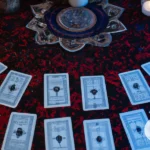Tarot reading is an ancient practice that involves the use of a deck of cards to gain insight into one’s past, present, and future. As individuals seek guidance and answers to questions about their lives, confidentiality in tarot readings becomes increasingly important. It is essential that the client feels secure and comfortable sharing their deepest concerns and questions, and that the reader maintains a level of professionalism and confidentiality. In this comprehensive guide, we will explore why confidentiality is vital in tarot readings, its overall benefits, and how to keep confidentiality in your tarot readings.
What is Tarot Reading?
Tarot reading is a practice that uses a deck of cards, comprised of 78 unique cards, to provide insight and guidance to those seeking answers. Each card has a specific meaning, and readers use their knowledge of the cards and intuition to interpret them in relation to a client’s specific situation. Tarot readings can cover a variety of topics, such as relationships, career, and personal growth.
Most commonly, tarot readings are sought out for:
- Providing insight into a particular issue or question an individual may have
- Aiding in decision-making
- Clarifying options and potential outcomes
Tarot readings can be conducted in person or remotely, either over the phone or online. Regardless of the method chosen, it is essential that the client feels comfortable and able to express themselves openly. This is where confidentiality becomes especially important. As a tarot reader, it is crucial to establish trust with your clients and honor their privacy.
To establish confidentiality in tarot readings, it’s important to have a clear understanding of what this means for both the client and the tarot reader. Many professional organizations and tarot associations have guidelines outlining best practices for confidentiality in tarot readings, which we will explore in more detail later in this article.
Why is Confidentiality Important?
Confidentiality is important in tarot readings for various reasons. For starters, when you’re getting a reading, you’re talking about some very personal and sensitive information. Tarot readings are used to help people with their personal problems, which means that clients are opening up and sharing a lot about themselves with their reader. This information should be kept private as it can be embarrassing or even damaging to the client if it was to be shared without their consent.
Confidentiality strengthens trust between the client and the reader. If the client knows that their information will be kept private, they’re more likely to feel comfortable opening up and being honest with their reader. In contrast, if they think their information will be shared, they may withhold certain details, which can negatively impact the accuracy of the reading.
Additionally, confidentiality is important for the reputation of the reader. If a reader breaches confidentiality, it can damage their professional reputation and credibility. The inverted pyramid below illustrates why confidentiality is important in tarot reading.

| Reasons Confidentiality is Important for: | Clients | Readers |
|---|---|---|
| Comfort and Trust | ✓ | ✓ |
| Reputation | ✓ | |
| Personal Information | ✓ |
Ensuring that a tarot reading is confidential is an ethical responsibility for the reader. It’s not only about protecting the client’s image but also about complying with privacy laws. Confidentiality also helps to foster a sense of responsibility within the reader because they’re aware that they’re dealing with personal information.
In summary, confidentiality in tarot readings is important to protect personal information, promote trust between the client and the reader, maintain the reader’s reputation, and preserve the ethical standards of the practice.
The Benefits of Confidentiality

There are multiple benefits to maintaining confidentiality when it comes to tarot readings. Both the client and reader can benefit from knowing that the details of the reading will remain private.
One of the main benefits of confidentiality for the client is that they can feel safe and secure in sharing personal information with their tarot reader. By knowing that their private thoughts, experiences, fears, and hopes will remain confidential, clients are more likely to be honest and open during the reading. This can lead to a more accurate and insightful reading, which can be incredibly empowering for the client.
Additionally, confidentiality can help clients feel more comfortable sharing potentially sensitive information without fear of judgment or repercussions. This can be especially important for clients who are dealing with difficult or traumatic experiences. By sharing their experiences in a confidential setting, clients can feel heard and supported, which can lead to greater healing and emotional growth.
Maintaining confidentiality is also important for tarot readers. By establishing trust with their clients, readers are more likely to have repeat business and a positive reputation in the tarot community. Additionally, having a reputation for maintaining confidentiality can attract new clients who are looking for a safe and supportive space for their readings.
Maintaining confidentiality can help readers avoid potential legal issues related to privacy and data protection. By keeping records confidential and respecting clients’ privacy, readers can avoid legal repercussions and protect their business from lawsuits.
Confidentiality is essential for both the client and reader in tarot readings. By maintaining confidentiality, clients can feel safe and supported sharing personal information during their readings, while readers can establish trust and a positive reputation in the community, as well as avoid legal issues related to privacy.
If you would like to learn more about how to establish confidentiality with your tarot clients, check out our article on establishing confidentiality. You can also read about the importance of group tarot confidentiality or what happens in case of a confidentiality breach in tarot readings at group tarot confidentiality and confidentiality breach articles, respectively.
For the Client
Confidentiality in tarot readings is essential for clients in many ways:
1. Privacy Protection: Clients who are consulting tarot readers for sensitive or personal issues need assurance that their information will be protected. By maintaining confidentiality, tarot readers provide clients with a safe space to share their concerns and fears without the fear of judgement or repercussions.
2. Establishing Trust: Client trust is one of the most critical components of a tarot reading. A client skilled with reading can provide accurate and helpful guidance to their client. Maintaining client confidentiality helps the client feel safe to open up about their concerns and builds the trust between the reader and client.
3. Encourages Honesty: When clients feel that their information is safe and kept confidential, they might be more likely to be honest and open about their concerns. This information can help the tarot reader provide more accurate and meaningful guidance.
4. Assurance of Professionalism: Confidentiality also signals that the tarot reader is professional and is committed to providing the best possible experience for the clients. It shows that they take their work and clients seriously, which can earn the reader a positive reputation in the community.
5. Peace of Mind: By keeping the client’s information private, tarot readers ensure their clients have peace of mind and can freely explore their concerns without worrying about the information shared becoming public. It also ensures that the client’s safety and well-being are maintained.
Maintaining confidentiality in tarot readings is crucial for clients as it fosters trust, honesty, and allows them a safe and receptive space to explore and resolve their concerns.
For the Reader
For the Reader: Confidentiality is not only important for the client, it’s also crucial for the reader. As a tarot reader, maintaining confidentiality helps to build trust and establish credibility with clients. When clients trust that their privacy will be respected, they are more likely to open up and share personal information that can lead to more accurate and helpful readings.
In addition to building trust, maintaining confidentiality can also prevent potential legal issues. Tarot readers are privy to sensitive information that could have legal implications if shared without permission. Breaching confidentiality can result in lawsuits and damage to the reader’s reputation.
Respecting confidentiality shows professionalism and respect for the client’s personal boundaries. It demonstrates that the reader is committed to providing a safe and supportive space for clients to explore their thoughts, feelings, and concerns without fear of judgment or exposure.
Maintaining confidentiality can also have a positive impact on the reader’s personal and professional life. By respecting and valuing confidentiality in their work as a tarot reader, they are more likely to carry this value over into other areas of their life. This helps to build a reputation of trustworthiness and integrity, not only in the tarot community but in all areas of life.
Maintaining confidentiality in tarot readings benefits both the client and the reader. For the reader, it helps to build trust, prevent legal issues, and demonstrate professionalism and respect.
How to Maintain Confidentiality in Tarot Readings
Maintaining confidentiality is paramount for both the tarot reader and the client. Here are some effective ways to protect your client’s privacy during tarot readings:
One of the most straightforward ways to maintain confidentiality during tarot readings is by utilizing private spaces. Ensure that your reading space is free from outside disturbances or interruptions and that you are not being overheard. This includes closing windows and doors, turning off electronic devices, and maintaining sufficient distance from others.
Keeping confidential records of consultations is crucial. Still, it is equally important to store them securely and dispose of them conscientiously when they are no longer needed. Encrypting digital records and filing paper documents in a locked cabinet are just two ways to keep records entirely confidential.
The best way to maintain confidentiality in tarot readings is by abiding by the professional codes of ethics outlined by various tarot organizations. Professional tarot readers are required to uphold trust, maintain confidentiality, and ensure that their clients feel comfortable and secure. Numerous professional tarot organizations enforce these codes of ethics and require their members to follow them closely.
Summary:
- Use private spaces for the tarot readings to maintain confidentiality by protecting clients’ privacy.
- Keep confidential records and store them securely with locked cabinets or encrypting digital files.
- Abide by professional codes of ethics outlined by various tarot organizations, which ensure trust, confidentiality, and client’s sense of security.
By following these tips, you can help ensure your client’s privacy and build trust with them. Remember, a tarot reading is a deeply personal experience, and clients must feel safe and secure sharing intimate details of their lives.
Using Private Spaces
When it comes to maintaining confidentiality in tarot readings, using private spaces is crucial. This means finding a quiet, secluded area where the reading can take place without interruptions or snooping.
One option is to conduct the reading in a private room, such as a home office or dedicated reading space. This allows for complete privacy and reduces the risk of outside individuals overhearing sensitive information.
If a private room is not available, consider using a divider or partition to create a secluded area within a larger space. This can be achieved with curtains, room dividers, or even a simple folding screen.
Regardless of the location, it’s important to choose a space where unauthorized individuals are not present. This means keeping the door closed or using a “do not disturb” sign to prevent interruptions.
Additionally, electronic devices should be turned off or silenced during the reading to prevent any unwanted recordings or distractions.
By taking these steps, tarot readers can create a private, secure space for their clients to feel comfortable and openly share their thoughts and feelings without fear of someone else hearing.
Keeping Records Confidential
Another important aspect of maintaining confidentiality in tarot readings is keeping records confidential. This includes any notes, audio recordings, or video recordings of the session.
One way to ensure record confidentiality is to use a secure and password-protected system for storing any digital records. It’s important to avoid using public or shared devices where the records can be easily accessed by unauthorized persons.
Additionally, physical records such as notes taken during the session should be kept in a safe location where they cannot be easily accessed by others. This means avoiding leaving them out in the open or in plain sight, especially in areas where other people might be present.
It’s important to note that the responsibility of keeping records confidential falls on both the client and the reader. Clients should be cautious about sharing any recordings or notes with others, as this can compromise their confidentiality. Readers, on the other hand, should take steps to ensure that their own notes and recordings are secure and protected at all times.
In some cases, clients may ask to have their records destroyed after the session as an added precaution. As a reader, it’s important to respect this request and follow through with it promptly to ensure that the records are not inadvertently accessed or shared without the client’s permission.
Maintaining the confidentiality of any records related to tarot readings is an essential part of the process. By taking steps to protect these records, readers can help ensure that clients feel safe and secure in sharing their thoughts and feelings during the session, knowing that their personal information is being kept confidential.
Professional Codes of Ethics
Professional codes of ethics are written guidelines that are designed to set standards of behavior and conduct for Tarot readers. These codes are meant to ensure that Tarot readers perform their professional duties in a manner that is ethical, impartial, and confidential.
One of the most important aspects of a professional code of ethics is its emphasis on confidentiality. Tarot readers are expected to respect the privacy of their clients by safeguarding their personal information. This includes not discussing personal information about the client with anyone else, unless the client has given explicit permission to do so.
Another important aspect of the professional code of ethics for Tarot readers is the principle of impartiality. This means that Tarot readers must be objective and unbiased in their readings. They should not let their personal beliefs, attitudes, or opinions influence their interpretations of the Tarot cards. Instead, Tarot readers should strive to provide an accurate and honest reading that is based solely on the cards themselves.
Additionally, professional codes of ethics for Tarot readers emphasize the importance of maintaining appropriate boundaries with clients. Tarot readers should avoid developing personal relationships or engaging in any behavior that could be interpreted as inappropriate or unprofessional. Maintaining professional boundaries helps protect not only the client but also the reader.
Finally, professional codes of ethics require Tarot readers to be fully trained and qualified to provide Tarot readings. This means completing a comprehensive training program, obtaining certification if required by law in their area, and staying up-to-date with the latest Tarot reading techniques and practices through ongoing professional development.
Professional codes of ethics are essential for maintaining the integrity, impartiality, and confidentiality of Tarot readings. By adhering to these guidelines, Tarot readers help ensure that their clients receive reliable and professional Tarot readings that they can trust.
What Happens When Confidentiality is Breached?

What Happens When Confidentiality is Breached?
When confidentiality is breached in a Tarot reading, it can have serious consequences for both the client and the reader. One of the most important things for a Tarot reader to do is to make sure that they respect their client’s privacy and keep everything confidential.
If confidentiality is breached, the client’s trust in the reader can be lost. Without trust, the relationship between the client and reader can become damaged and even irreparable. The client may feel betrayed and may not return for future readings or may even write a negative review which can impact the reader’s reputation.
Additionally, if a reader breaches a client’s confidentiality, they may face legal consequences depending on the nature of the breach. This is especially true for sensitive issues such as child abuse, domestic violence, or other forms of illegal activity that may have been revealed during the reading.
A Tarot reader who breaches confidentiality may also face disciplinary action from their professional organization if they have violated any codes of ethics. They could face expulsion from the organization which can lead to a loss of credibility and potential clients.
Breach of confidentiality is taken very seriously in the world of Tarot reading. Tarot reading relies on trust and confidentiality between the reader and the client. Breaching these can lead to serious consequences, including legal and disciplinary action. It is important for a reader to understand the severity of breaking confidentiality and to take every possible step to maintain it.
Common Questions About Confidentiality in Tarot Readings
Tarot reading is a spiritual practice that involves divination and is performed by a trained professional. To help you feel more comfortable during your reading, it’s important to understand the role of confidentiality in tarot reading. Here are some common questions about confidentiality in tarot readings:
| Question | Answer |
|---|---|
| Can I Request Confidentiality As a Client? | Yes, you can request confidentiality as a client. This means that the reader will not share your reading or any information about you with anyone else, including friends or family members. It’s important to make this request at the beginning of the reading to ensure that the reader is aware of your wishes. |
| Can My Tarot Reader Talk About My Reading With Others? | No, your tarot reader should never talk about your reading with others without your permission. This is a breach of confidentiality, and it goes against the reader’s professional code of ethics. If you feel that your reader has violated your confidentiality, you have the right to file a complaint. |
| What If I Want to Share My Reading With Others? | If you want to share your reading with others, it’s up to you. However, it’s important to keep in mind that your reading is confidential, and sharing it can compromise your privacy. If you do decide to share yourSubscribe to Our NewsletterSign up to receive the latest news and updates. |
It’s important to remember that confidentiality is a key component of tarot reading. It helps to establish trust between the client and the reader and creates a safe and supportive space for spiritual exploration. If you have any concerns about confidentiality during your reading, be sure to discuss them with your reader beforehand. By doing so, you can help ensure that your reading is a positive and empowering experience.
Can I Request Confidentiality As a Client?
If you are seeking a tarot reading, it is important to know that you have the right to request confidentiality. This is a common concern for many clients, and it is natural to want to keep your personal information private. The good news is that tarot readers are trained to respect your privacy, and will typically have a system in place to ensure that your information is kept confidential.
The answer is yes, you can absolutely request confidentiality as a client. In fact, most tarot readers will have a confidentiality policy that is clearly communicated to clients. This policy should include details about how personal information is stored, who has access to it, and how it is used.
One way to maintain confidentiality is to use a private space for the reading. This means that the reading is conducted in a place where other people cannot overhear what is being said. For example, a tarot reader may have a designated room in their home or office where they conduct readings. This provides a secure and private space for the client to share their thoughts and feelings without worrying about who might be listening.
Another way to maintain confidentiality is to keep records of the reading confidential. This means that any notes or recordings taken during the reading are only accessible to the tarot reader and are not shared with anyone else. Additionally, the client may request that their reading not be recorded at all. This is a common practice among tarot readers who value privacy and confidentiality.
When a client requests confidentiality, it is important for the tarot reader to respect that request. This means that they should not share any information with others unless they have explicit permission from the client to do so. If a tarot reader breaches confidentiality, it can damage their reputation and may even result in legal action.
If you are concerned about confidentiality, it is important to discuss this with your tarot reader before the reading begins. By doing so, you can ensure that your information is kept confidential and that you can relax and enjoy the experience without worrying about your privacy being compromised.
| Question | Answer |
| Can I request confidentiality? | Yes, you have the right to request confidentiality. |
| How do I know if my information is being kept confidential? | Ask your tarot reader about their confidentiality policy before the reading begins. |
| What if I don’t want my reading to be recorded? | You can request that your reading not be recorded at all. |
| What if my tarot reader breaches confidentiality? | If a tarot reader breaches confidentiality, it can damage their reputation and may even result in legal action. |
Can My Tarot Reader Talk About My Reading With Others?
Confidentiality is a key aspect of tarot reading, and it is important for clients to feel secure in the knowledge that their personal information is protected. One of the main concerns that clients have is whether their tarot reader is allowed to discuss their reading with others.
The short answer is no. Tarot readers are bound by ethical codes that require them to maintain the confidentiality of their clients at all times. Any information that is disclosed during a reading must be kept strictly confidential. This includes information on the reading itself, as well as any personal details that the client may have shared.
Clients should be aware that there may be certain situations where a tarot reader is required by law to disclose information, such as if they are subpoenaed to testify in a court of law. However, in general, tarot readers are not allowed to talk about their clients’ readings or disclose any personal information that they may have shared during the session.
It should be noted that some exceptions do exist where a tarot reader may be able to discuss a client’s reading with others. For example, a tarot reader may be able to discuss a reading with a colleague or mentor for the purpose of gaining feedback or guidance. However, even in these circumstances, the reader must still ensure that the client’s personal information is protected.
If a tarot reader does breach confidentiality by discussing a client’s reading with others, they can face serious consequences. Not only could they end up losing their clients’ trust, but they could also face legal action if the breach of confidentiality results in harm to the client.
Clients can rest assured that their tarot reader is bound by ethical codes that require them to maintain confidentiality at all times. If you have any concerns about confidentiality, it is important to discuss these with your tarot reader before the reading begins. By doing so, you can establish expectations and ensure that your personal information remains safe and protected.
What If I Want to Share My Reading With Others?
It’s natural for someone to feel excited or curious about their Tarot reading results and want to share their experience with others. However, when it comes to maintaining confidentiality, it’s important to consider the potential consequences before sharing any details about the reading.
Firstly, it’s essential to keep in mind that the information gained in a Tarot reading is personal and private to the client. Sharing details of the reading with others without the client’s consent is a breach of confidentiality and goes against the code of ethics followed in Tarot reading practices. In fact, many professional readers have strict policies in place regarding keeping client information confidential and may refuse to provide services to individuals who disregard this.
Secondly, sharing the results of one’s reading may impact the effectiveness and accuracy of the Tarot. The energies and interpretations derived from a reading rely heavily upon the individual receiving the reading and their personal situation. When someone else gets involved, they may unknowingly influence the client’s own perceptions, leading to a diminished benefit from the original reading.
Finally, it’s important to consider the feelings and privacy of others. If someone confides in you about their Tarot reading results, it’s best to be respectful of their personal information and only share with others if they explicitly give their permission.
While it’s understandable to want to share the experience of a Tarot reading with others, it’s crucial to first consider client confidentiality, the accuracy of interpretations, and the privacy of others involved. It’s best practice to seek permission before sharing any details and to respect the personal nature of the information gained in a reading.
Conclusion
In conclusion, confidentiality is essential in tarot readings. This principle guarantees that clients’ information is secure and private, reducing the risk of disclosure through unauthorized parties. Maintaining confidentiality creates a sense of trust between the reader and the client, providing a safe space that enhances the reading’s effectiveness.
To uphold confidentiality during tarot readings, the client’s privacy should always be a top priority. Using private spaces such as a therapist’s office or a private room at home reduces the risk of interruptions and eavesdropping. Keeping records and documentation of readings confidential, and only sharing them with authorized parties contributes to trust-building. Professional codes of ethics, which many tarot readers adhere to, typically include a confidentiality clause, which guides their conduct.
Breaching confidentiality in tarot readings can have grave consequences for both the client and the reader. It can harm the client’s mental state or reputation and lead to loss of trust or legal battles for the reader. Therefore, understanding the consequences and taking measures to prevent breaches is essential.
It is common that clients may wonder about confidentiality in tarot readings. They may want to know if they can request confidentiality, if the reader can talk about their readings with others, or if they can share their readings with others. Educating clients about the importance of confidentiality and its benefits can help them know their rights and make informed decisions.
Overall, confidentiality is important in tarot readings for creating a safe and secure space for the clients. By maintaining confidentiality, the reader ensures trust-building and fosters a deeper connection with the client. Tarot readings can be emotionally sensitive, personal, and revealing, and confidentiality helps create a safe environment for clients to explore their feelings with confidence and security.
Final Thoughts
Final Thoughts
It’s evident that confidentiality is a crucial aspect of tarot readings. Tarot readings are a means of exploring personal matters and gaining insight into situations otherwise unknown. As a result, clients must be confident that their information won’t be disclosed or discussed with third parties. Tarot readers must protect their client’s confidentiality while also ensuring that their professional reputation remains intact.
In light of this, it’s crucial to understand the importance of confidentiality and adhere to ethical standards to protect both clients and readers. While maintaining confidentiality may require extra effort, it ultimately benefits all parties involved. Clients are more likely to feel comfortable and share personal information, which can lead to a more accurate and insightful reading.
Similarly, readers can establish themselves as ethical and reputable professionals. Maintaining confidentiality is an integral part of professional conduct, and failing to do so can jeopardize their reputation and business.
Confidentiality is an aspect of tarot reading that should not be overlooked. It’s necessary to establish clear guidelines and communication with clients regarding their expectations while also being mindful of professional expectations. By prioritizing confidentiality, tarot readings can remain a safe and valuable practice for all involved.
Table of Contents:
– Introduction
– What is Tarot Reading?
– Why is Confidentiality Important?
– The Benefits of Confidentiality
– For the Client
– For the Reader
– How to Maintain Confidentiality in Tarot Readings
– Using Private Spaces
– Keeping Records Confidential
– Professional Codes of Ethics
– What Happens When Confidentiality is Breached?
– Common Questions About Confidentiality in Tarot Readings
– Can I Request Confidentiality As a Client?
– Can My Tarot Reader Talk About My Reading With Others?
– What If I Want to Share My Reading With Others?
– Conclusion
– Final Thoughts
Frequently Asked Questions
What is a Tarot reading?
Tarot reading is a method of divination where a seeker asks a reader to draw cards from a tarot deck and interpret their meanings in relation to the seeker’s question or situation.
Why is confidentiality important in tarot readings?
Confidentiality is crucial in tarot readings because it creates a safe, trusting space for clients to explore their deepest thoughts and feelings. Breaching confidentiality can cause harm, break trust, and damage the tarot reader’s reputation.
What are some benefits of confidentiality in tarot readings for the client?
Confidentiality allows clients to feel safe enough to share their deepest fears and desires, receive non-judgmental support and guidance, gain clarity and insight into their situations, and make empowered decisions.
What are some benefits of confidentiality in tarot readings for the reader?
Confidentiality allows tarot readers to establish themselves as trustworthy and professional, build long-term relationships with clients, protect their clients’ privacy and safety, and adhere to professional codes of ethics.
How can tarot readers maintain confidentiality during readings?
Tarot readers can maintain confidentiality by using private spaces, keeping records confidential, following professional codes of ethics, and obtaining written consent from clients before sharing their information with third parties.
What happens when confidentiality is breached in tarot readings?
When confidentiality is breached, clients may feel violated, exposed, or even endangered. Tarot readers may face legal and professional consequences, suffer reputational damage, and lose clients’ trust.
Can clients request confidentiality in tarot readings?
Yes, clients have the right to request confidentiality in tarot readings. Some tarot readers may have their own policies on confidentiality and may require clients to sign a confidentiality agreement before the reading.
Can tarot readers talk about clients’ readings with others?
No, tarot readers should never disclose clients’ personal information or readings to third parties without their written consent. Doing so can breach confidentiality, violate professional ethics, and put clients at risk.
What if a client wants to share their reading with others?
If a client wants to share their reading with others, they should obtain the tarot reader’s written permission first. The reader may have their own policies on sharing information and may require clients to take certain precautions to protect their privacy.
What are some professional codes of ethics for tarot readers?
Professional codes of ethics for tarot readers may vary, but they typically include maintaining confidentiality, respecting clients’ privacy and autonomy, providing honest and accurate readings, obtaining informed consent, avoiding dual relationships, and seeking supervision and training when needed.










